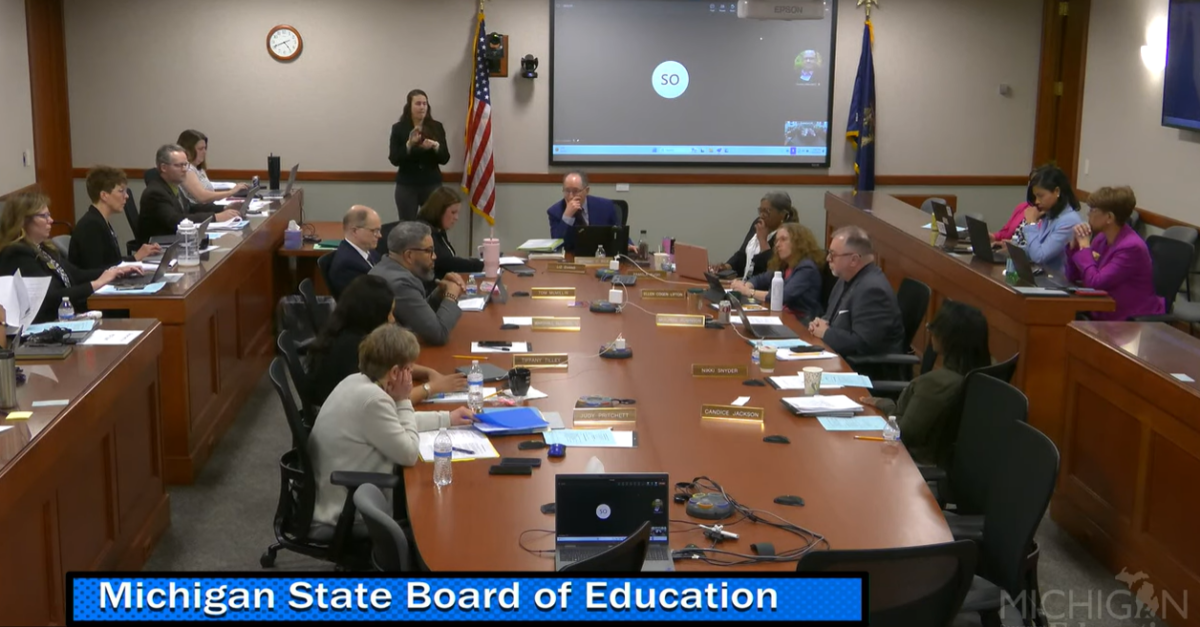
Democratic lawmakers are hashing out plans to bring state funding for Michigan’s public schools to another new, all-time high—and ensure teachers are paid fairly.
MICHIGAN—Gov. Gretchen Whitmer’s latest record-setting budget plan for public schools is one step closer to being finalized after state Sen. Darrin Camilleri (D-Trenton) and a state Senate subcommittee this week approved recommendations for the state’s School Aid budget.
In a statement, Camilleri said the funding recommendations that advanced this week would bring state school funding to its highest level in state history—beating out a record that was just set last year, shortly after Democrats took control of the Legislature in the 2022 elections.
“Last year we took a historic step to pass the most progressive education budget our state had ever seen,” he said. “I am proud to offer this recommendation for 2025 that will go even further toward fulfilling our commitment to providing all Michigan students with an excellent education.”
Record-Setting School Funding
Whitmer’s initial $80.7 billion budget recommendation included $19 billion to support public schools—including a $241 (or 2.5%) increase in the base amount that each district receives per student. All told, her proposal sought to bring state funding to a record $9,849 per student.
The budget recommendations that advanced this week would push those state funding levels even higher—bringing the state’s total proposed foundation allowance to $9,910 per student.
Focused Student Support
Some students need more help than others—and Whitmer’s budget plan recognized that by investing hundreds of millions of dollars to support student mental health, school safety needs, literacy grants and coaches, and continued funding for the MI Kids Back on Track program, which provides tutoring and other learning opportunities for kids both before and after school.
The budget recommendations approved this week by the Senate Pre-K-12 Appropriations Subcommittee would increase state funding for at-risk students by $123 million—in addition to an extra $16 million for special education students and $3 million for literacy coaches next year.
While the new recommendations would actually reduce funding to the Kids Back on Track program compared to this year, Camilleri said it would still invest in “students who need it most” by allocating the funding on a per-pupil basis instead of requiring districts to apply for the cash.
“As a former teacher, I recognize the importance of crafting a state budget that puts educators and students at the forefront—one that includes their input gained through dialogue, and ultimately one that ensures all students have the support they need to learn and grow,” he said.
Whitmer’s budget plan also sought a 5% increase in funding for English language learners. This week’s recommendations would instead double the funding from last year to about $80 million.
Free Breakfast and Lunch
It’s hard to learn on an empty stomach. The current state budget recognizes that by providing funds to cover free breakfast and lunch for all 1.4 million Michigan public school students. The move has been estimated to have saved Michigan families over $850 per child per year.
The latest recommendations aim to keep that funding flowing by allocating another $40 million to provide universally-free breakfast and lunch to every student at every public school statewide.
Supporting Students by Supporting Teachers
Whitmer’s budget plan included $175 million to support the MI Future Educator Fellowship, which covers tuition for college students who want to become certified teachers, as well as provides stipend payments to student teachers who decide to work in Michigan after graduation.
The idea is cyclical: Recruit more teachers into the classroom—and then ensure they stay in Michigan, so they can provide a high-quality education to more Michigan students.
Camilleri said the funding recommendations that were approved this week call for investing about $75 million to continue the student loan stipend program for Michigan teachers, as well as another $26 million for a new “teacher leadership development” initiative that aims to help accomplished teachers take on greater leadership roles while remaining in the classroom.
Under the latest recommendations, districts would also be able to use up to 60% of the funding for at-risk students to fund their teachers’ salaries. Camilleri said that would help ensure educators are being fairly compensated in districts with higher amounts of at-risk students.
“Supporting our teachers and retaining talented educators takes a multifaceted approach to compensate them appropriately, reduce their debt, and provide career advancement opportunities that keep them in the classroom,” Camilleri said in a statement. “Teachers play such a crucial role with impacts that reach far beyond the books and the classroom. Our kids deserve the best teachers, which is why we are continuing to push the best policies for them.”
Free Preschool
Whitmer’s latest budget plan earmarked $63.5 million to provide free preschool for every 4-year-old child across the state—a move that would save families an average of $10,000 a year for each child in preschool, according to state estimates provided by Whitmer’s office.
“When we get this done, no matter who you are, where you come from, or how much you make, your child can enroll in pre-K and be set up for success,” Whitmer said during her State of the State speech in January, where she announced her revised free preschool plan.
The latest recommendations would slow that rollout and give districts more time to prepare for universal preschool—namely by only offering free preschool next year to Michigan families that are earning less than 400% of the federal poverty line, or about $120,000 for a family of four.
What’s next?
The proposal now heads to the full Senate Appropriations Committee for further consideration.
Democrats recently regained full control of state government after two special House elections—a sign that budget negotiations will likely continue to move quickly in Lansing.
READ MORE: 7 ways Whitmer’s new budget plan invests in Michigan kids and schools
For the latest Michigan news, follow The ‘Gander on Twitter.
Follow Political Correspondent Kyle Kaminski here.
Politics

Elissa Slotkin: Not even birth control access will be safe if Trump wins in 2024
Michiganders may think their reproductive rights are safe, but Trump and Republicans are already plotting their next steps to take away access in...

Why you should care about this year’s Michigan Supreme Court election
Michiganders will soon decide who serves on the highest court in the state—and those two justices will have a hand in making some important...

Dozens march to Flint city hall as the water crisis turns 10 years old
BY KEN COLEMAN, MICHIGAN ADVANCE MICHIGAN—Chanting “Clean water is what we demand,” “Water is a right” and “No justice, no peace,” dozens of people...
Local News

Who makes the best cannabis concentrates in Michigan?
Over the last year, we've asked for reader recommendations for the best dispensaries in Michigan and the best weed, best edibles and best vapes you...

7 quick hits of cannabis news from across Michigan
MICHIGAN—Cannabis is a big deal in Michigan—and there’s never a shortage of newsworthy headlines from the industry as the state inches closer to...






